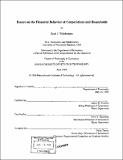Essays on the financial behavior of corporations and households
Author(s)
Weisbenner, Scott J
DownloadFull printable version (8.101Mb)
Other Contributors
Massachusetts Institute of Technology. Dept. of Economics.
Advisor
James M. Poterba and Jerry A. Hausman.
Terms of use
Metadata
Show full item recordAbstract
This thesis consists of three essays. The first essay investigates what role employee stock options and CEO compensation have in explaining the surge in corporate share repurchases in the mid 1990s. Corporations may opt to fund options with repurchased shares to avoid the immediate dilution of earnings per share. Whether the top executives receive stock-based compensation may also influence distribution decisions. To test the importance of these two hypotheses, I collect data on stock option programs for over 800 U. S. corporations at the end of 1994. Estimates suggest that a firm with outstanding options representing 10% of shares outstanding will repurchase .9 percentage points more stock in 1995, as opposed to a firm with no option program. Once total outstanding options are controlled for, CEO options and option holdings of the top five executives are if anything negatively correlated with stock buybacks. Firms whose CEOs hold options are significantly more likely to retain earnings. The paper also considers what role the taxation of distributions has in explaining the growth of corporate share repurchases. The second essay examines how participant choice in pension plans affects household portfolios. Some retirement plans allow the participant to choose how funds are invested. Being exposed to historical differences in asset returns may provide the participant with financial education which would otherwise not be received. This paper finds that households covered with pension plans in which the employee must decide upon investments are significantly more apt to hold stock outside of their retirement plan relative to households with plans offering no choice. The third essay investigates the effect of specific features of the U.S. capital gains tax on turn-of-the-year stock returns. Both the fraction of long-term losses that are deductible from Adjusted Gross Income and the required holding period for long-term losses have changed over the past three decades. These changes alter the incentives for year-end capital loss realization for individual investors. This paper presents evidence that is consistent with the hypothesis that detailed provisions of the capital gains tax affect the link between past capital losses and turn-of-the- year stock returns.
Description
Thesis (Ph.D.)--Massachusetts Institute of Technology, Dept. of Economics, c1999. Includes bibliographical references.
Date issued
1999Department
Massachusetts Institute of Technology. Department of EconomicsPublisher
Massachusetts Institute of Technology
Keywords
Economics.